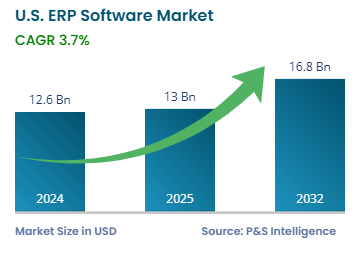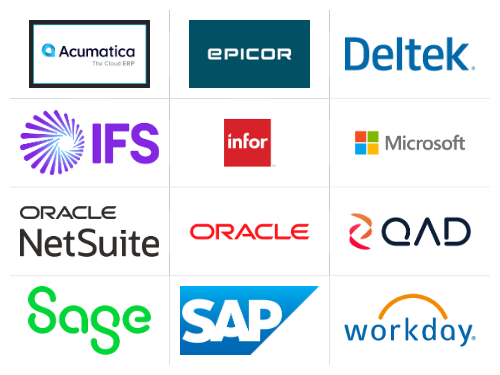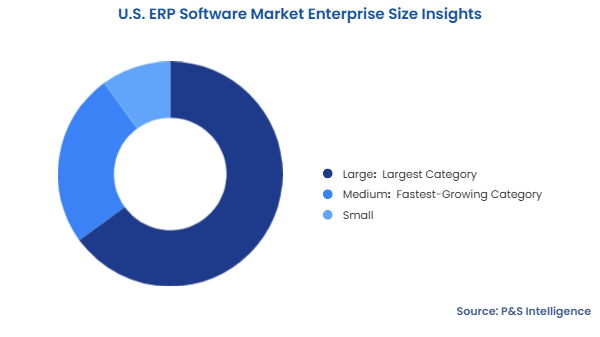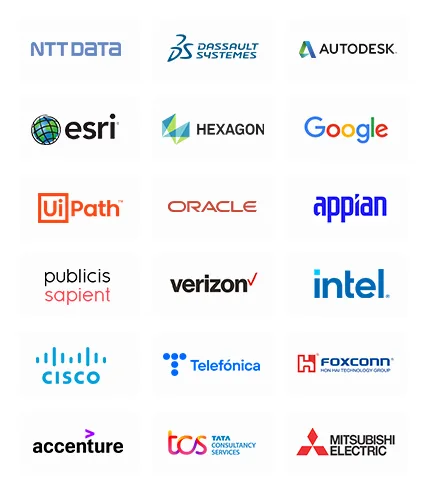Market Statistics
| Study Period | 2019 - 2032 |
| 2024 Market Size | USD 12.6 Billion |
| 2025 Market Size | USD 13.0 Billion |
| 2032 Forecast | USD 16.8 Billion |
| Growth Rate (CAGR) | 3.7% |
| Largest Region | West |
| Fastest-Growing Region | South |
| Nature of the Market | Fragmented |
Report Code: 13384
This Report Provides In-Depth Analysis of the U.S. ERP Software Market Report Prepared by P&S Intelligence, Segmented by Deployment (On-premises, Cloud, Hybrid), Business Function (Human Resource, Supply Chain, Customer Management, Inventory Management, Manufacturing Module, Finance), Enterprise Size (Large, Medium, Small), Vertical (Manufacturing, BFSI, IT & Telecom, Retail & Consumer Goods, Healthcare, Transportation & Logistics, Government, Aerospace & Defense), and Geographical Outlook for the Period of 2019 to 2032
| Study Period | 2019 - 2032 |
| 2024 Market Size | USD 12.6 Billion |
| 2025 Market Size | USD 13.0 Billion |
| 2032 Forecast | USD 16.8 Billion |
| Growth Rate (CAGR) | 3.7% |
| Largest Region | West |
| Fastest-Growing Region | South |
| Nature of the Market | Fragmented |


|
Explore the market potential with our data-driven report
The U.S. enterprise resource planning software market valued at USD 12.6 billion in 2024, which is set to grow at a CAGR of 3.7% during 2025–2032, to reach USD 16.8 billion in 2032. This growth is due to need of companies to enhance the efficiency of their operations. ERP software streamlines operations across departments and with the help of data analysis, helping make better decisions.
Due to rapid digital transformation and the adoption of the cloud, Industry 4.0, and IoT, ERP software is becoming more useful for businesses. Its adoption is growing because organizations value data-driven decisions more than ever. This is why they need systems with advanced analytics capabilities, alongside real-time reporting features. The uptake of ERP platforms is further advancing with the integration of emerging technologies, such as artificial intelligence, machine learning, and IoT. Businesses’ strong focus on operational transparency and regulatory compliance makes ERP implementation essential for precise tracking and reporting.
Businesses use ERP systems to simplify business operations and enhance performance while advancing complete digital transformation initiatives.
The on-premises category is the largest in 2024 because it enables autonomous management of their data security design for organizations while enabling customization and seamless IT infrastructure integration. Enterprises operating in heavily regulated sectors with complicated operations typically select on-premises solutions to exert enhanced system control and fulfill regulatory requirements.
Cloud is the fastest-growing category because it offers scalable solutions with high cost-effectiveness and flexibility. Organizations adopt cloud ERP solutions because they deliver ease of use, quick implementation, and access to real-time data in a digital transformation environment.
Deployments studied in the report:
The finance category dominates the market as finance departments use ERP systems to gain fundamental accounting features, financial reporting capabilities, budgeting tools, and regulatory compliance. Organizations within every sector depend on solid financial management solutions, which makes ERP adoption essential for strong financial oversight. ERP enables accurate financial reporting, combined with real-time data visibility to support business decisions and regulatory requirements.
Supply chain has emerged as the fastest-growing category, with 4.2% CAGR, because organizations require real-time data, improved visibility, optimized logistics management, and procurement and inventory control. This is especially true for manufacturing, pharmaceuticals, retail, chemicals, consumer goods, and other industries that deal in physical products, especially amidst the e-commerce boom.
Business functions covered in the report:
Large enterprises lead the market with 65% revenue in 2024. This is because they operate with complex systems and have substantial requirements and abundant financial capacity to acquire custom-made ERP solutions. Large enterprises execute ERP projects earlier in their development cycle, mostly choosing fully integrated multivariant ERP solutions to unify business operations across diverse locations and departments.
Medium enterprises are the fastest-growing category because of the advent of cloud-based solutions, which combine affordability with scalability for operational streamlining and business expansion.

Enterprise sizes taken under study:
The manufacturing category is the largest because its sophisticated operations need a unified system to combine the control of supply chains with production, inventory management, and financial operations. The adoption of ERP systems in manufacturing has been motivated by their ability to deliver automated operations and optimized production flows combined with reduced operating expenses.
Healthcare is the fastest-growing category with 4.5% CAGR because care providers use ERP to enhance operations, manage patient information, and fulfill regulatory needs. The healthcare category is experiences a rapid expansion because healthcare providers work to obtain real-time data and enhance operational efficiency.
Verticals studied in the report:
Drive strategic growth with comprehensive market analysis
The West is the dominant region with USD 4.4 billion revenue in 2024. The high concentration of technology companies and early adoption of cloud-based ERP solutions make Silicon Valley a prominent market in the region.
The South is experiencing the fastest growth, driven by the expansion of the manufacturing and logistics sectors, availability of cost-effective ERP solutions, and emergence of tech hubs, such as Austin, Texas.
Regions covered:
Want a report tailored exactly to your business need?
Request CustomizationLeading companies across industries trust us to deliver data-driven insights and innovative solutions for their most critical decisions. From data-driven strategies to actionable insights, we empower the decision-makers who shape industries and define the future. From Fortune 500 companies to innovative startups, we are proud to partner with organisations that drive progress in their industries.


Working with P&S Intelligence and their team was an absolute pleasure – their awareness of timelines and commitment to value greatly contributed to our project's success. Eagerly anticipating future collaborations.
McKinsey & Company
IndiaOur insights into the minutest levels of the markets, including the latest trends and competitive landscape, give you all the answers you need to take your business to new heights
We take a cautious approach to protecting your personal and confidential information. Trust is the strongest bond that connects us and our clients, and trust we build by complying with all international and domestic data protection and privacy laws
Customize the Report to Align with Your Business Objectives
Request the Free Sample Pages